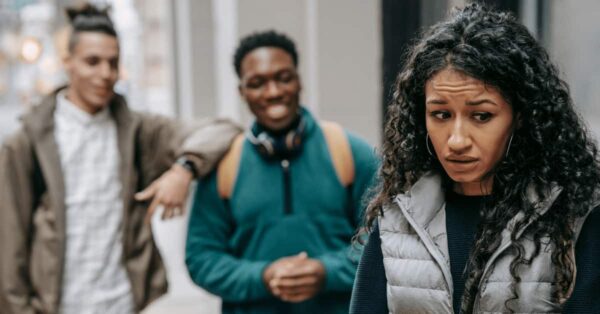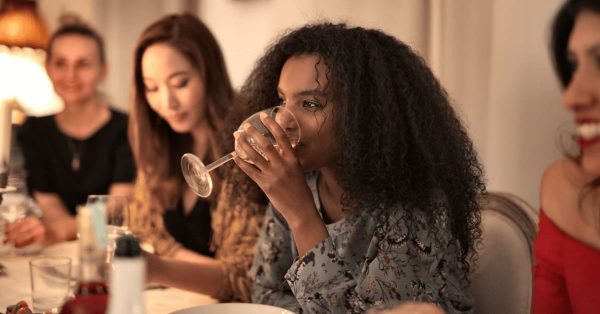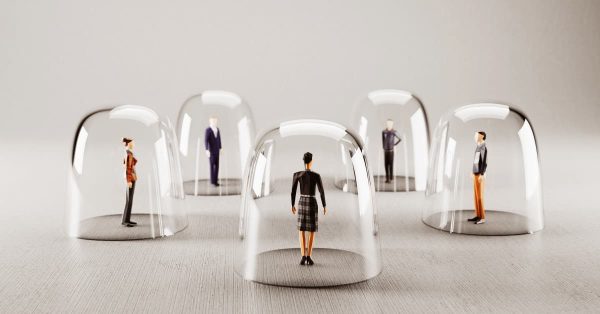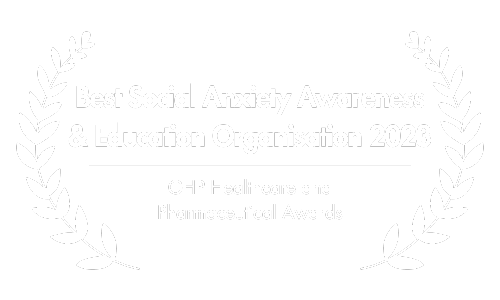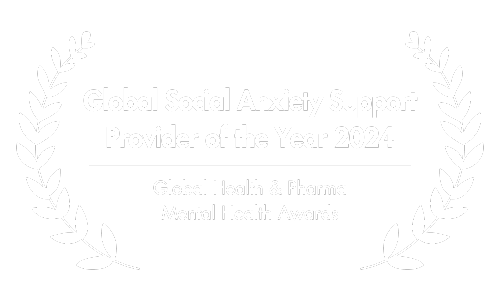Dating With Social Anxiety: 15 Tips To Help You Thrive
There are many doubts that can make people feel anxious and insecure when going on a first date.
“Do I look attractive enough?”
“What are we going to talk about?”
“Will I appear nervous?”
“What if I say something stupid?”
“What if we just sit their in awkward silence?
Although these types of anxious thoughts are quite common on the way to a first romantic get together, for most people they usually wear off quite quickly as they get to know their date.
Unfortunately, this is not the case for everyone.
Those with social anxiety disorder (SAD), also called social phobia, usually cling to these concerns in an almost obsessive fashion.
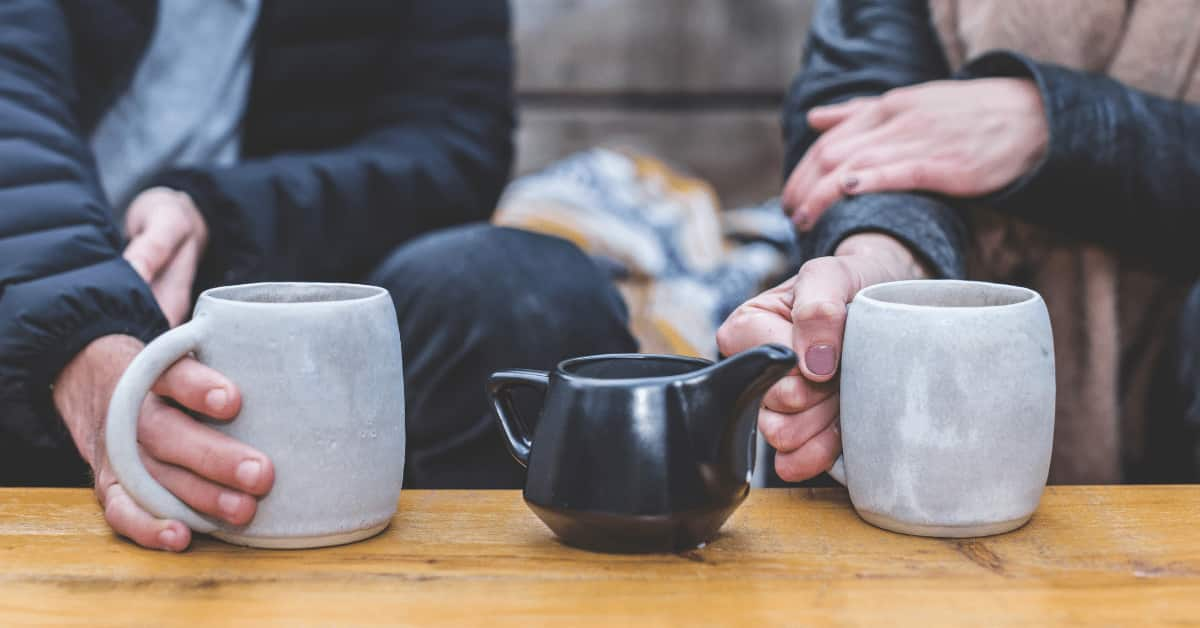
The result? Intense insecurity, physical anxiety symptoms and often the fear of being found out as inept. This, of course, makes dating less fun and often less rewarding.
It is easy to see that dating with social anxiety can represent a real challenge for everyone involved – both, the affected people themselves, as well as their dating partners.
In this guide, we will shed light on the phenomenon of social phobia in the dating realm, answer important questions regarding the topic and provide practical advice on how to make dating fun and fruitful – despite persistent social fears.
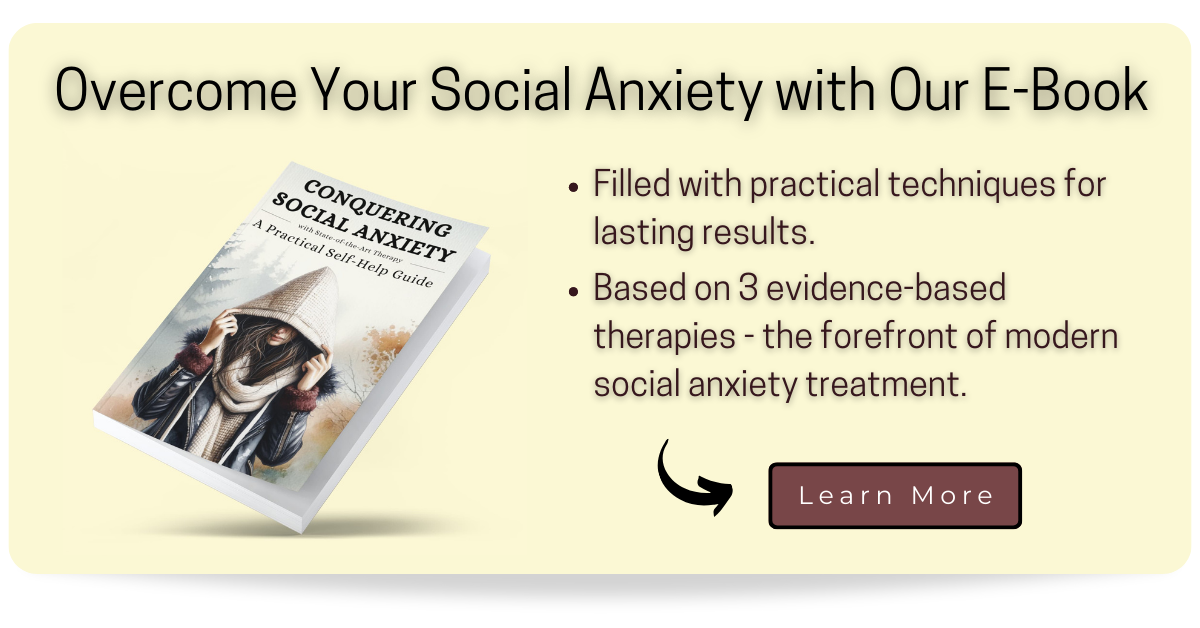
Why Do You Feel Insecure When Dating?
As we have mentioned above, feelings of self-doubt and uncertainty are experienced by most people before and during a first romantic encounter.
But why do we experience such insecurity when dating?
When going on a date, we naturally want to make a good impression. As we are highly motivated to be perceived as a potential partner, we worry about exposing aspects of ourselves that may reveal the opposite. The resulting feeling of insecurity keeps us aware of how we come across.
This way, being somewhat concerned about the impression we generate on our date is usually very helpful.

However, when these concerns become excessive, the benefits quickly subside. Increased levels of social anxiety can easily get in the way of being perceived as interesting, attractive, competent, or charming.
Being aware of this, socially anxious people often shy away from dating, as they not only have to endure the feelings of fierce anxiety, but also see little chances of seeming attractive to their dates.
Can You Date If You Have Social Anxiety?
The excessive fear of being judged, negatively evaluated or rejected is the hallmark of social anxiety disorder (American Psychiatric Association, 2013).
Therefore, it is natural for affected people to shy away from social situations that could lead to possible scrutiny by others. Dating certainly forms part of these types of situations.
However, this does not mean that you cannot date if you have social phobia.
People with social anxiety disorder can date just as anybody else. Because of their condition, they may benefit from choosing locations and activities that do not cause additional anxiety. For many, it is advisable to refrain from dating individuals who are exceedingly judgmental.

Yes, dating can be quite stressful for those with SAD.
However, with the right mindset and a couple of practical tools, you will be able to enjoy getting to know potential partners and find the entire endeavor rewarding.
Should You Tell Your Date You Have Social Anxiety?
People with social phobia tend to be highly self-critical. Because of that, they often see themselves in a more negative light than others.
However, affected individuals are mostly not aware of this and assume that others judge them just as harshly as they judge themselves.
As a result, socially anxious people often believe that others have tremendously high expectations of them. This, paired with low confidence in their abilities to meet these high standards, leads to increased levels of stress and anxiety.
One way of decreasing the perceived pressure to perform is to reduce others’ expectations. Have a look at this short animation to understand this principle.
As this animation depicts, believing that others have lower expectations of us can decrease distress and physical arousal.
By disclosing personal vulnerabilities, you do not have to worry about them being revealed at a later point. As a result, you may feel less pressured to pretend you are somebody you are not.
But does this mean you should tell your date about your social anxiety?
On a first date, consider mentioning that you have been nervous all day or that you are feeling a little insecure. This may take the edge off your social anxiety. However, do not go overboard by sharing your mental health condition with someone you just met.
Being open, honest and sincere is a great idea for a first date. But make sure to respect your own boundaries.
If you feel uncomfortable eating in public, suggest another activity to get to know each other. At this point you do not have to give explanations of why you prefer another activity or location.
If it is too distressing for you to spend various hours with your date, arrange a meeting for an hour or two.
In case you feel overwhelmed with anxiety when meeting up, share that you feel nervous.
Like this, you communicate your social anxiety in a genuine way, without carrying it too far.

Practical Tips For Dating With Social Anxiety
Social anxiety arises when we are motivated to make a particular impression on others, but lack confidence in our ability to do so successfully (Leary, 2001).
Therefore, experiencing social anxiety while dating is a strong indicator that you long for love, acceptance, recognition, closeness and intimacy.
These are perfectly normal, very human needs, which should not be ignored.

However, while you may be motivated to satisfy your need for deeper human connection, you might also be wondering how to date if you have social anxiety.
The following recommendations can be seen as a helpful guide for those who want to date and suffer from social phobia.
Keep in mind that every person is unique and that not all of these tips apply to every single case.
(1) Understand that every healthy person feels insecure and nervous on a first date.
Many socially anxious people believe that feelings of anxiety in social situations are not normal.
However, this could not be further from the truth, especially when talking about first dates.
Be assured that everyone gets nervous when meeting up with a stranger they are attracted to and want to win over.

Of course, some do so more intensely than others. But in the end, you and your date are in the same boat.
This means that any manifestations of anxiety from your side are likely to be met with comprehension.
Remembering this can not only reduce your anxiety, but also help you feel more connected to the person you are meeting.
(2) Suggest locations that suit you.
When going on a date, your stress levels are already high enough. The last thing you need is to add fuel to the fire by meeting at a location that causes you additional distress.
For example, if you know that crowded places make you feel uncomfortable, suggest an alternative place to meet.
If you get anxious taking public transportation, make sure to take a cab if you and your date want to get from A to B.
If you feel uncomfortable being alone with your date, suggest a location with other people present.
Generally, socially anxious people should seek exposure to the situations that scare them. However, you are already doing this by meeting up with a person you are attracted to.
Be nice to yourself and choose a place that suits you.
(3) Choose activities you enjoy.
Just as you want to choose locations that make you feel at ease, make sure to suggest activities you enjoy.
For some people with social anxiety, having dinner or going for drinks can represent a major threat, as some affected people feel uncomfortable eating or drinking in public.
Others may shy away from social events with large crowds or from doing something more interactive such as cooking together.
Think about what activities would make you feel uncomfortable during a date and identify those that would make you feel good.

For example, many socially anxious individuals prefer the outdoors and doing something interactive over traditional dates in a restaurant.
Do you feel good when moving your body? Why not go for a hike or a stroll through a park?
Do you feel more comfortable without any distractions so you can focus on the conversation? Maybe just go to a quiet restaurant or bar.
Think about the activities that you usually enjoy. Chances are that these may be great activities for a captivating date.
(4) Pick the right moment and duration for your date.
Among the factors that can have an important impact on the way you feel during a date are the time of the week as well as the duration of your rendezvous.
For example, if your work tends to be stressful, you may not want to choose to have dates on Monday nights.
Likewise, if you have a lot on your plate at a given moment, you may consider postponing your date for a couple of days.
Remember that dating is not only about getting to know each other, but also about having a good time.

The same accounts for the duration of your date. Socially anxious people often wear out quite quickly when exposed to social situations they experience as stressful.
If that the case for you, let your date know ahead of time that you have about two hours (or whatever feels comfortable to you).
Like this, you can avoid becoming overwhelmed and actually enjoy the time you have together.
However, make sure you communicate this in a nice way. You do not want your date to feel like you do not want to spend time with them or that you are rude.
Instead, make sure they perceive that you are looking forward to meeting them.
(5) Wear an outfit that makes you feel good.
You probably know the feeling of wearing a new piece of clothing and still not feeling quite comfortable in it.
While there is nothing wrong with trying out new things, you may want to refrain from doing so on a first date.
The same applies for new haircuts or other major changes to your personal style.
You do not need an extra layer of insecurity in this moment. Stick to what makes you feel comfortable.

(6) Consider sharing that you feel nervous.
Social anxiety can easily be exacerbated by the fear of others finding out about it.
Like this, you may worry that others see your hands shake, notice that your voice is cracking up, or see you blush and sweat, among other examples.
Some people may also worry about seeming insecure by being too quiet or saying “weird” things.
No matter your particular fear, if you try to hide that you are anxious, your insecurity is likely to increase even further.
For this reason, it can be deliberating to share your internal state. Like this, your date already knows you are nervous and will not expect you to be overly confident.
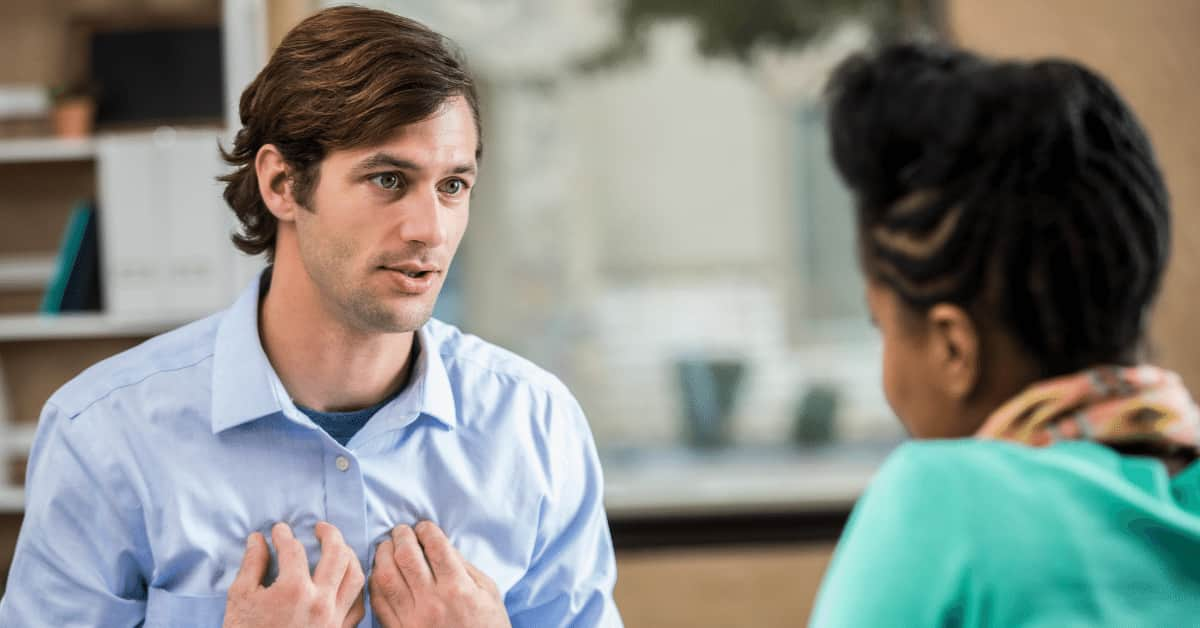
In many cases, your date will even let you know that they feel insecure as well.
If you date a nice person, being vulnerable is likely going to help connect and feel more comfortable.
(7) Show genuine interest in your date.
When we are anxious, we can quickly become self-absorbed. This, of course, is the opposite of what we want during a date.
Instead of asking random questions just to keep the conversation going, ask stuff that you are really interested in.
It can be helpful to think about this before your date and come up with a couple of things you genuinely want to know about your dating partner.
Like this, you will not only feel calmer during your date because you know you have a bunch of things to talk about, but your conversations are also likely going to be much more interesting and meaningful.
Also, there are few things in life that feel as good as being of real interest to another person.
Showing sincere interest will make your date feel special and it will let them know that you really want to get to know them.
(8) Engage in active listening.
When we are anxious, our body is in survival mode. In such a state, your brain scans the environment for threats.
In the case of social anxiety, your brain is highly alert to any cues that could signal disapproval or rejection, like others’ negative facial expressions or body language.
Listening attentively to what your conversation partner is telling you can represent quite a challenge when you are in survival mode.
Therefore, socially anxious people often struggle with having interesting and meaningful conversations.
Out of the fear of sitting in awkward silence, they may think about what to say next. Others may be highly self-conscious, monitoring their posture, their facial expressions, as well as their internal bodily sensations.
Engaging in these types of attentional processes gets in the way of having a good conversation that flows naturally.
To counteract this, you can practice active listening. This process basically refers to paying close attention to what your conversation partner is saying and acting upon it.

A person who engages in active listening is likely to:
- send verbal and non-verbal cues that tell their conversation partner that they are listening (“Aha”, “I see”, nod their head, display appropriate facial expressions, etc.);
- ask for clarification if they do not understand something;
- request more details to better understand their conversation partner’s message;
- inquire to hear the end of the story if the conversation has drifted off elsewhere;
- summarize or paraphrase what their conversation partner has said to be sure they got their point;
- add personal anecdotes, experiences, or opinions when appropriate, among other things.
By doing so, you do not only lower your social anxiety as you are fully immersed in conversation, but your conversations will also be much more meaningful, leaving your date feeling respected and valued.
(9) Meet up in person and dig deeper into the things you already texted about.
Sometimes, conversations develop and evolve by themselves. Other times it can be a little tricky to make the conversation flow.
Many socially phobic individuals use online dating apps to meet potential romantic partners. While texting can make the initial contact much easier, it can also get in the way of connecting on a real level.
Many times, people report that the conversation flowed very well when texting, but did not when meeting up in person.
While there are certainly various components involved, one reason can be that people text for too long before meeting up in real life.
Consider meeting up early and have conversations in person.
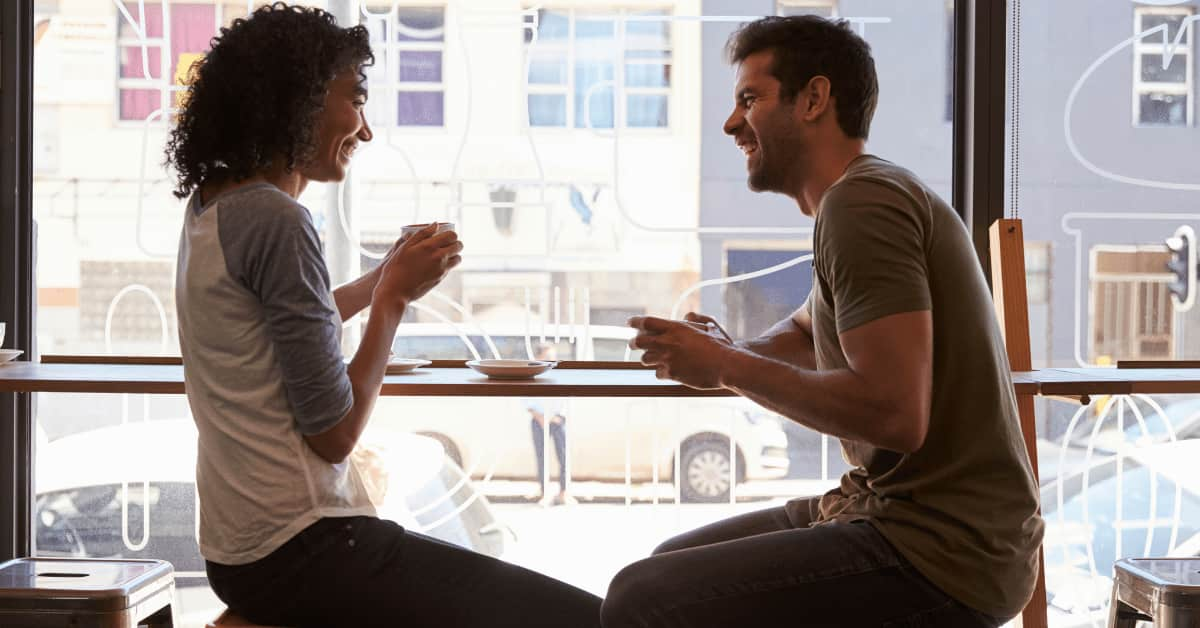
If you have texted for a long time and feel like you have already asked the person everything you wanted to know, go into more detail when meeting up in person.
Why did the person choose this profession? How come they practice a certain hobby and why do they enjoy it so much? What makes them who they are?
Use your time together to really get to know each other. This way, you practice your dating skills and you will quickly know whether or not you are a good match.
(10) Allow your anxiety to come up and accompany you.
Social anxiety can be highly uncomfortable. Therefore, it is only natural to try and suppress it.
However, these attempts usually backfire, generating even more intense anxiety reactions (Wells, 2009).
This is true for both, physical anxiety reactions, as well as anxiety-provoking thoughts. Fighting them is like pouring gasoline into the fire. It only makes your situation worse.
As we cover in our article on metacognitive therapy for social anxiety, stopping these unhelpful attempts of resistance is an important step into the right direction.
Instead of fighting them and hoping they will not show up, accept that you will get anxious and allow your social anxiety to arise.
Like this, you can avoid becoming anxious because of your anxiety and you are less likely to feel overwhelmed.
(11) Focus on the present moment.
On a date, many people worry about what to talk about next or they think about an awkward comment they made before.
While most people can let these thoughts come and go quite easily, those with social anxiety disorder often obsess over them.
If you find yourself worrying about how you are coming across, what to say next, or how your date might have thought about something you said or did earlier, you may benefit from refocusing on the present moment.

This exact principle is practiced in mindfulness meditation, where people typically focus on their breath. As soon as they notice that their attention has drifted off, they let their current thoughts go and refocus.
When dating, you can apply the same principle. Decide to focus on the present moment, such as the conversation you are having.
As soon as you realize that an anxious thought has distracted you, let it go and refocus on the present moment.
Directing your attention this way can be a powerful tool against feelings of social anxiety. For an introduction to meditation for social anxiety, see our introductory guide to mindfulness.
(12) Remember it takes two to tango.
Do you feel uncomfortable being with your date and not knowing what to talk about?
If you do, you are not alone. Most people feel this way.
After all, you are just getting to know each other and it can be tricky to find topics that both of you enjoy talking about.
While many people with social anxiety are typically the more quiet ones during a date, there are also those who speak a lot.
Both of these behaviors can be seen as attempts to deal with insecurity and can have negative effects.
Whether you form part of the former or the latter of these groups, remember that a date requires a certain effort from both sides.
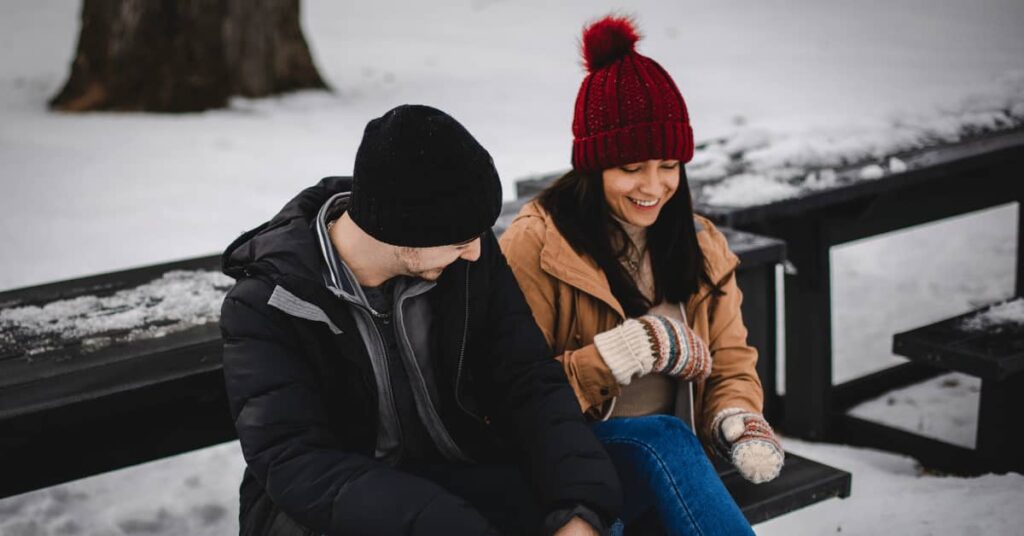
If you stay overly quiet, your date may feel uncomfortable and overwhelmed with having to guide the whole conversation.
If you talk a lot (either because you are nervous or because you feel responsible for avoiding awkward silences), you may wear yourself out or do not allow your date the space they need.
Of course, you have a natural tendency to behave a certain way when feeling anxious. However, try being a little more talkative if you tend to be quiet and give your date room to lead if you tend to take over the conversation.

(13) Open up and be vulnerable.
When going on a date, we naturally want to make a good impression.
We dress up, are polite, hold back certain comments and try to avoid showing the parts of ourselves we believe are less desirable.
While these things are totally normal and usually appropriate, avoiding to reveal important parts of who we are can easily come along with important drawbacks.
The first dates are the perfect opportunity to touch topics that really matter to you, because this gives you the chance to identify how your conversation partner reacts to and thinks about them.
In addition to ethical questions you feel passionate about, you may want to consider sharing important caveats related to your social anxiety.
This can be done without openly saying that you suffer from social anxiety disorder.
Instead, you can choose a more subtle approach and share that you feel somewhat uncomfortable in certain situations.
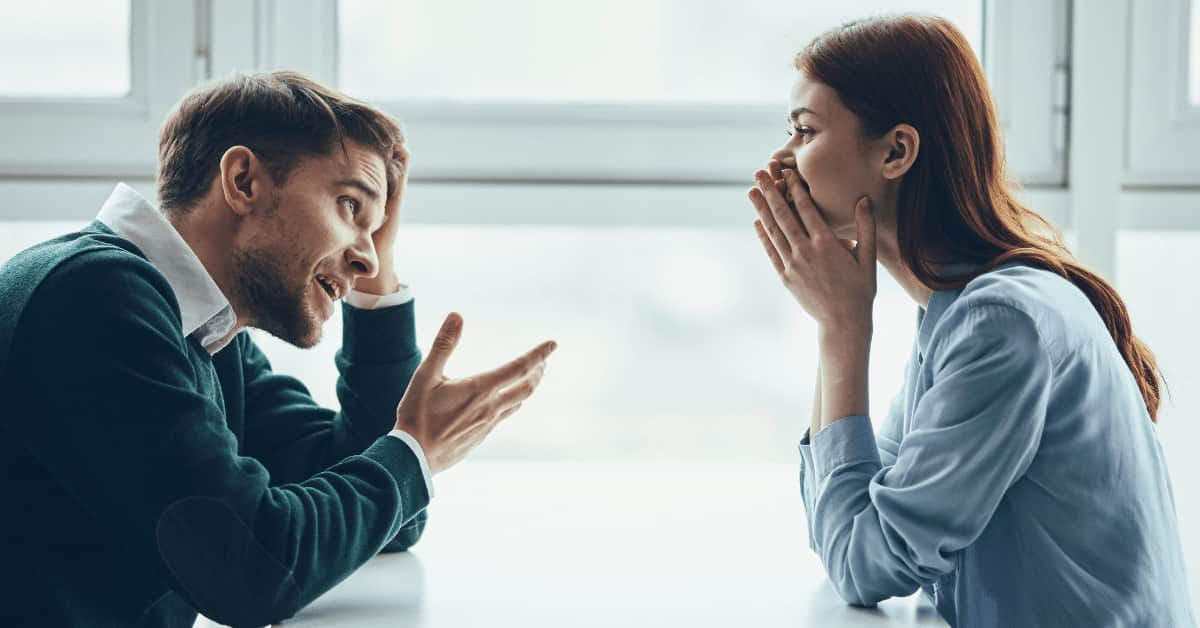
This is obviously not the right approach for everyone. However, opening up about the parts of yourself you consider less attractive gives your date the chance to react in an understanding and supportive way.
If they discard your feelings and do not react nicely, they are probably not a person you would want to have a serious relationship with.
In many cases, the first date may not be the right moment for this strategy. But doing so at some moment will help you understand whether or not your date may be the one.
At the same time, you actively practice self-acceptance when sharing your insecure parts with other people. However, always make sure to protect your boundaries by not sharing too much, too soon.
(14) If you are attracted to your date, communicate it.
At the heart of social anxiety lies the fear of being rejected.
While nobody wants to be rejected, most people can get over this fear because they are motivated by the prospect of successful social outcomes.
Individuals with SAD often struggle with this, as they tend to overestimate the likelihood of being disapproved of.
For this reasons, socially anxious people typically try to play it safe and not risk too much.
When dating someone you like, but you miss out on letting them know you are attracted to them, they may think you are not interested and stop going out with you.
Sure, the fact you are dating them implies a basic interest from your side. However, assuming a reserved attitude throughout the first couple of dates is likely going to let them grow unsure about your feelings and intentions.
There are many ways to let your date know you are attracted to them.
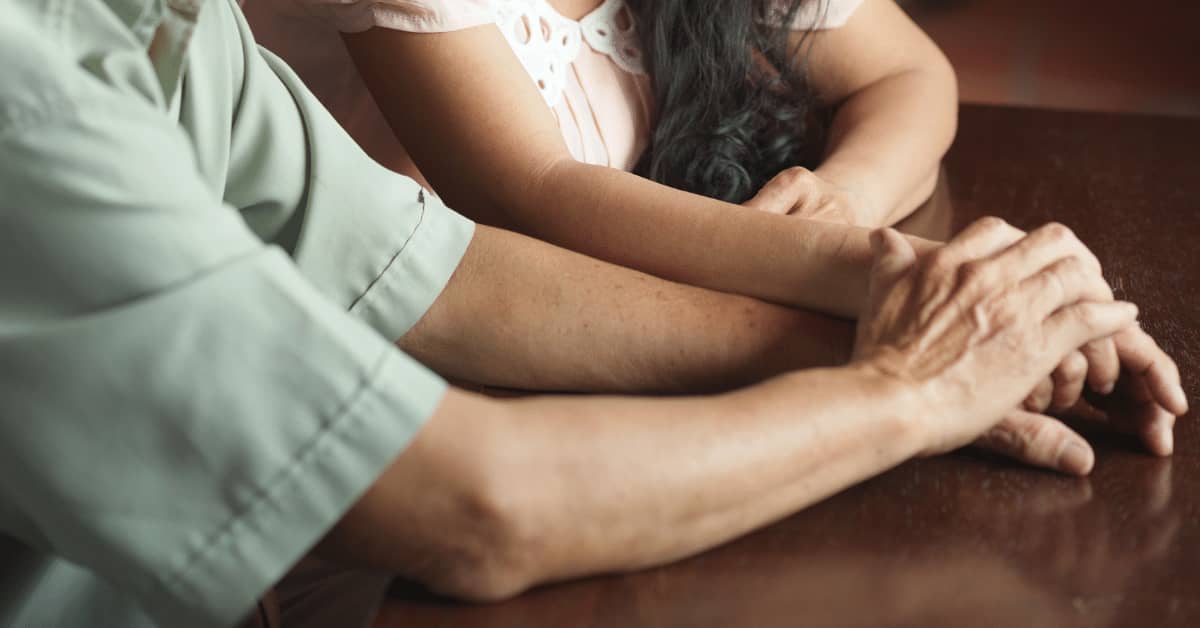
Some people may do so through brief, repeated body contact, such as touching their date’s forearms or thighs.
Others might let their date read through the lines or simply tell them “I really like you”.
Whatever your personal style, do not miss out on letting you date know you are sincerely interested and attracted to them.
(15) Date nice, friendly and respectful people.
While this last point is probably the most obvious one, it is also the most important recommendation.
While most people would likely benefit from refraining to date rude, unfriendly and disrespectful people, even more so do individuals with social phobia.
Remember that social anxiety disorder is characterized by an excessive fear of being judged, negatively evaluated or rejected (American Psychiatric Association, 2013).
While it is on you to work on decreasing this hypersensitivity to social disapproval, you deserve to be with someone who supports and respects you.
If you suffer from social anxiety, but want dating to be fun, here is our most important recommendation:
Make sure the people you go out with are nice, polite, peaceful and loving human beings.
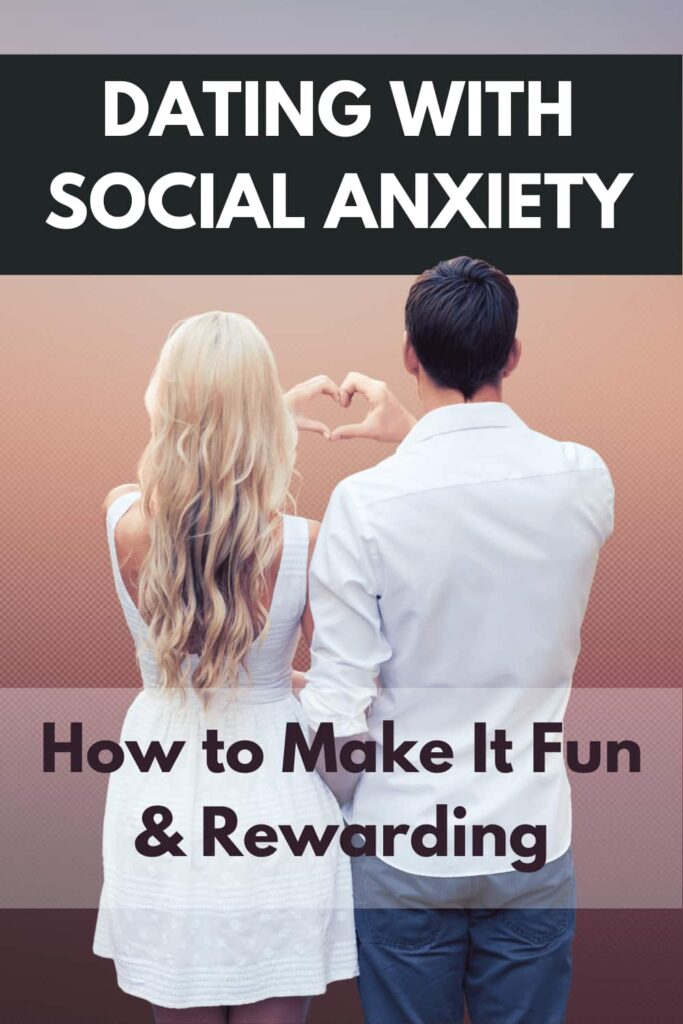
Pin | Share | Follow
[DISPLAY_ULTIMATE_SOCIAL_ICONS]
American Psychiatric Association. (2013). Diagnostic and statistical manual of mental disorders (5th ed.). Arlington, VA: American Psychiatric Publishing.
Leary, M. R. (2001). Social anxiety as an early warning system: A refinement and extension of the self-presentation theory of social anxiety. In S. G. Hofmann & P. M. DiBartolo (Eds.), From social anxiety to social phobia: Multiple perspectives (pp. 321–334). Allyn & Bacon.
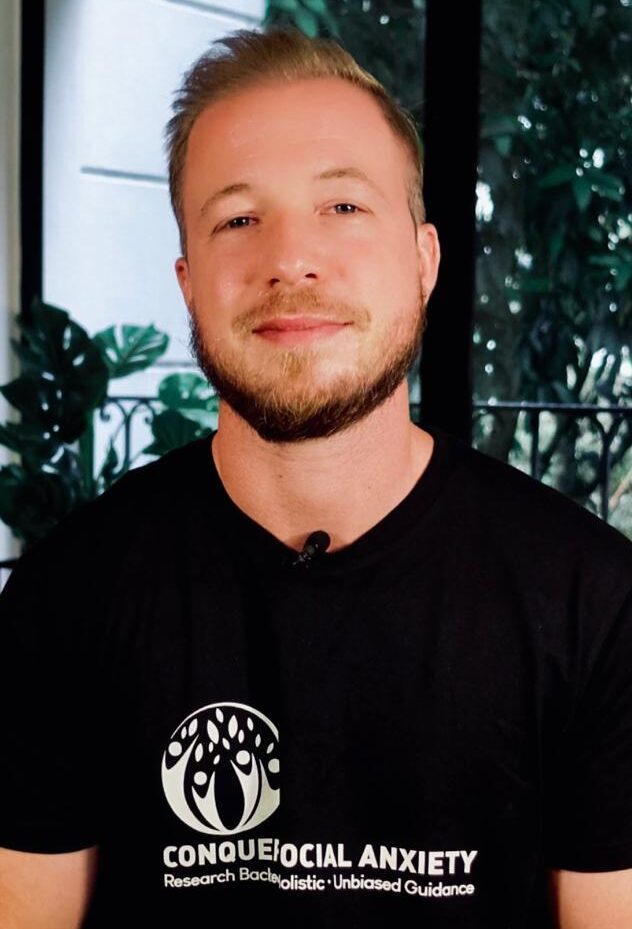
About the Author: Martin Stork
Martin is a professional psychologist with a background in physical therapy. He has organized and led various support groups for people with social anxiety in Washington, DC and Buenos Aires, Argentina. He is the founder of Conquer Social Anxiety Ltd, where he operates as a writer, therapist and director. You can click here to find out more about Martin.
